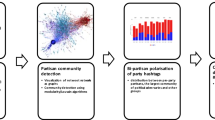Abstract
Twitter is a digital forum for political discourse. The emergence of phenomena like fake news and hate speech has shown that political discourse on micro-blogging can become strongly polarised by algorithmic enforcement of selective perception. Recent findings suggest that some political actors might employ strategies to actively facilitate polarisation on Twitter. With a network approach, we examine the case of the German far-right party Alternative für Deutschland (AfD) and their potential use of a “hashjacking” strategy (The use of someone else’s hashtag in order to promote one’s own social media agenda.). Our findings suggest that right-wing politicians (and their supporters/retweeters) actively and effectively polarise the discourse not just by using their own party hashtags, but also by “hashjacking” the political party hashtags of other established parties. The results underline the necessity to understand the success of right-wing parties, online and in elections, not entirely as a result of external effects (e.g. migration), but as a direct consequence of their digital political communication strategy.
Access this chapter
Tax calculation will be finalised at checkout
Purchases are for personal use only
Similar content being viewed by others

References
Blondel, V.D., Guillaume, J.L., Lambiotte, R., Lefebvre, E.: Fast unfolding of communities in large networks. J. Stat. Mech: Theory Exp. 2008(10), P10008 (2008)
Bode, L., Hanna, A., Yang, J., Shah, D.V.: Candidate networks, citizen clusters, and political expression: strategic hashtag use in the 2010 midterms. Ann. Am. Acad. Polit. Soc. Sci. 659(1), 149–165 (2015). https://doi.org/10.1177/0002716214563923
Colleoni, E., Rozza, A., Arvidsson, A.: Echo chamber or public sphere? predicting political orientation and measuring political homophily in Twitter using big data. J. Commun. 64(2), 317–332 (2014)
Conover, M.D., Ratkiewicz, J., Francisco, M., Goncalves, B., Flammini, A., Menczer, F.: Political Polarization on Twitter, p. 8 (2011)
Dahlgren, P.: The Internet, public spheres, and political communication: dispersion and deliberation. Polit. Commun. 22(2), 147–162 (2005). https://doi.org/10.1080/10584600590933160
Engesser, S., Ernst, N., Esser, F., Büchel, F.: Populism and social media: how politicians spread a fragmented ideology. Inf. Commun. Soc. 20(8), 1109–1126 (2017). https://doi.org/10.1080/1369118X.2016.1207697
Enli, G., Simonsen, C.A.: ‘Social media logic’ meets professional norms: Twitter hashtags usage by journalists and politicians. Inf. Commun. Soc. 21(8), 1081–1096 (2018). https://doi.org/10.1080/1369118X.2017.1301515
Frees, B., Koch, W.: Internetnutzung: frequenz und vielfalt nehmen in allen altersgruppen zu. Media Perspektiven 9(2015), 366–377 (2015)
Grinberg, N., Joseph, K., Friedland, L., Swire-Thompson, B., Lazer, D.: Fake news on Twitter during the 2016 U.S. presidential election. Science 363(6425), 374–378 (2019). https://doi.org/10.1126/science.aau2706
Jacomy, M., Venturini, T., Heymann, S., Bastian, M.: ForceAtlas2, a continuous graph layout algorithm for handy network visualization designed for the Gephi software. PLoS ONE 9(6), e98679 (2014)
Keller, T.R., Klinger, U.: Social bots in election campaigns: theoretical, empirical, and methodological implications. Polit. Commun. 36(1), 171–189 (2019). https://doi.org/10.1080/10584609.2018.1526238
Krämer, B.: Populist online practices: the function of the Internet in right-wing populism. Infor. Commun. Soc. 20(9), 1293–1309 (2017). https://doi.org/10.1080/1369118X.2017.1328520
Neuendorf, K.A.: The Content Analysis Guidebook. 2nd edn. SAGE, Los Angeles (2017)
Stier, S., et al.: Systematically Monitoring Social Media: the case of the German federal election 2017. GESIS Papers 2018/4 (2018)
Stier, S., Posch, L., Bleier, A., Strohmaier, M.: When populists become popular: comparing Facebook use by the right-wing movement Pegida and German political parties. Inf. Commun. Soc. 20(9), 1365–1388 (2017). https://doi.org/10.1080/1369118X.2017.1328519
Author information
Authors and Affiliations
Corresponding author
Editor information
Editors and Affiliations
A Appendix
A Appendix
Rights and permissions
Copyright information
© 2019 Springer Nature Switzerland AG
About this paper
Cite this paper
Darius, P., Stephany, F. (2019). “Hashjacking” the Debate: Polarisation Strategies of Germany’s Political Far-Right on Twitter. In: Weber, I., et al. Social Informatics. SocInfo 2019. Lecture Notes in Computer Science(), vol 11864. Springer, Cham. https://doi.org/10.1007/978-3-030-34971-4_21
Download citation
DOI: https://doi.org/10.1007/978-3-030-34971-4_21
Published:
Publisher Name: Springer, Cham
Print ISBN: 978-3-030-34970-7
Online ISBN: 978-3-030-34971-4
eBook Packages: Computer ScienceComputer Science (R0)



